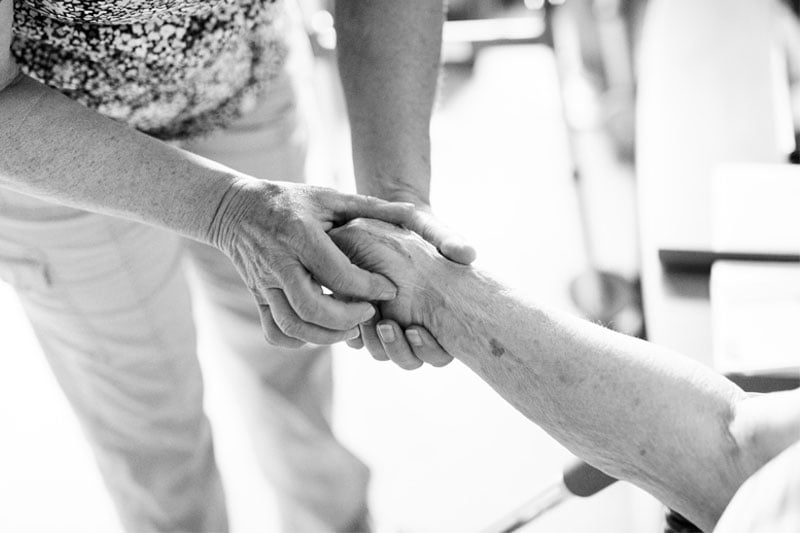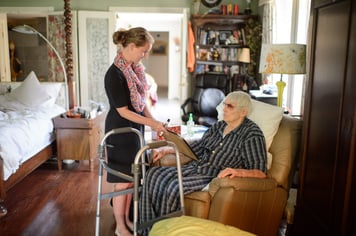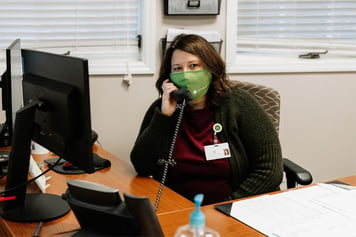Most people would rather not think about dying. We spend countless hours planning trips, social gatherings and investments, but we don’t prepare for death, the one certainty in life. If you want to have a good death – one that honors your wishes and doesn’t burden your loved ones – it helps to make a plan. Here are a few tips for how to prepare for death, regardless of your age or health status.
[callout 1]
1. Think About Your End-of-Life Wishes
It’s never too early to think about what you’d like to happen if you’re in an accident or diagnosed with a serious illness. Do you want to be in a hospital receiving every treatment available? If you’re diagnosed with an incurable illness, do you still wish to pursue every possible treatment? Would you want to die peacefully at home?
Most people want to die at home. Hospice provides in-home care to those who are terminally ill with a life expectancy of six months or less, yet only about half of people receive this type of care. It’s important to think about your preferences so you can advocate for your wishes when the time comes.
2. Create a Will
Most Americans, especially those under age 50, don’t have a will. But tragedy can strike at any age, and most people over 18 should have at least a basic one.
[action 1]
A will is a legal document that describes your wishes after you die. For example, what should happen with any property you own? Who should be your children’s guardian? Who do you trust to carry out your wishes after you die? A will answers these questions and designates a person to manage your affairs (your executor), so your loved ones aren’t left guessing what you would’ve wanted. You can also spell out your preferences for your funeral if you wish.
Even those without children, property or significant assets should consider a simple will. Some people write their own or fill out a template online. Those in more complex financial situations – for example, who need to name guardians for young children, set up trusts or plan for multiple generations – typically hire an estate planning attorney. Working with a professional offers peace of mind that your will was done correctly with consideration of all tax issues and legal requirements.
3. Consider Funeral Planning in Advance
If you don’t want your family to have to plan your funeral while they’re grieving, consider the gift of planning it in advance. Here are a few questions to consider:
- Do you want a burial? If so, you can buy a plot at a cemetery in advance.
- Would you prefer to be cremated? A funeral home can help arrange the details with you.
- Would you like to pay for your funeral arrangements in advance? This helps ensure your loved ones don’t have to pay thousands of dollars out-of-pocket while they wait for your money to be distributed through your will.
- Do you want anything specific to happen at your memorial service or wake?
Share your wishes with your loved ones, and add this information to your will if there are specific instructions you want followed.
4. Complete Medical Directives
What kind of medical care do you want if you’re unable to express your preferences? It’s a good idea to talk about this with your family. It’s an even better idea to document it in an official form, so you don’t have to worry about expensive court proceedings or having someone appointed to settle your affairs. The documents most adults should have include:
- Advance Health Care Directive (Living Will) – This document spells out your wishes for what types of medical care you want. For example, are there certain treatments (like feeding tubes, resuscitation or dialysis) you would rather not have? Or do you want to exhaust every treatment available? Do you want your organs donated?
- Durable Power of Attorney for Healthcare (Healthcare Proxy or Medical Power of Attorney) – This document designates a person who will speak for you if you can’t speak for yourself due to an accident, illness or other cause. They can also do things like make medical choices that aren’t covered in your living will, review your medical records and apply for Medicare. In some states, you can designate a medical power of attorney on your living will.
- Financial Power of Attorney – You may also want to consider having a general power of attorney, in addition to one for healthcare. This person can handle your financial or legal affairs if you get sick or cannot manage them on your own. There are different types of powers of attorney depending on your needs. Many people choose a durable power of attorney, which allows your power of attorney to take over your finances as soon as you need it and continues until you die. The power of attorney rights expire when you die. If you have a different person assigned as executor of your will, the executor takes control of your finances after your death.
You can have a lawyer help you write these, or you can look up your state’s forms online and complete them on your own. Some documents require two witness signatures and a stamp by a notary. Be sure your family, doctor and designated agents have a copy.
5. Organize Your Finances
Once your plans are laid out in your will, consider whether your loved ones will be able to find what they need to execute your wishes. Often, one member of the household manages all the finances. If something happens to them unexpectedly, the rest of the family is left to figure it out on their own.
Your loved ones need to know where they can find your life insurance policy and retirement plans, if you have them. You’ll also ease the burden on your loved ones if you have all your debts and bills, such as mortgages, car loans and credit cards, gathered in one place. Organize your assets in the same way, including property, cars, bank accounts, life insurance and investments. A financial advisor can help you get organized.
6. Organize Your Digital Life
Your loved ones will need to be able to access important information online, such as bank accounts. They’ll also need to be able to shut down certain services, such as your Facebook page. It’s easiest for your family if you have a list of accounts, usernames and passwords in a safe deposit box or an online password manager, along with instructions for how you’d like those accounts handled. Otherwise, they may have to jump through hoops like providing photo ID, a death certificate and other information to get access.
Gather any additional documents that may be needed to handle your affairs. Examples include birth certificates, marriage certificates, divorce or adoption papers, social security cards and Medicare/Medicaid numbers. You can keep everything in a folder or other centralized place and tell a trusted loved one where it is or who to contact when the time comes.
7. Revisit Your Plan
You may need to periodically review your plan and update your documents. Good times to revisit your preparing-for-death plan are when major life events happen, such as marriage, birth, divorce, inheritance, or the death of a loved one you’ve named as executor or beneficiary.
8. Talk, Share and Learn
If you’re preparing for the death of a parent or other loved one, this may be a good time for a life review. For example:
- Make a record of their life stories, common sayings or favorite recipes.
- Talk through ways they’d like loved ones to honor them or things they’d like to say or do.
- Reminisce about the past and say anything that needs to be said while you still have the opportunity.
- Share memories and experiences. This can bring closure to the person who is dying and help loved ones make memories they’ll hold onto as they move through the grieving process.
In addition to learning about each other, this may also be a good time to get familiar with common end-of-life symptoms. Every person’s journey is unique, but dying is a natural process that often follows predictable stages. Knowing what to expect can help you prepare for death and keep your loved one comfortable.
Hospice provides support at end of life for the entire family, from helping to care for a terminally ill loved one to long-term planning. This type of care frees families up to spend more quality time together and make meaningful memories. To learn more about hospice, call an Amedisys hospice agency near you.
Preparing for death isn’t a task most people look forward to, but it can spare you added stress during an already difficult time and help ensure your loved one’s wishes are fulfilled. With a little planning, you can help empower your loved ones to prepare for their own death and model how to pass on peacefully, with love and grace.
Reviewed by Laurie Brown, RN, BSN, MSN, CHPN, Hospice Clinical Education Specialist





